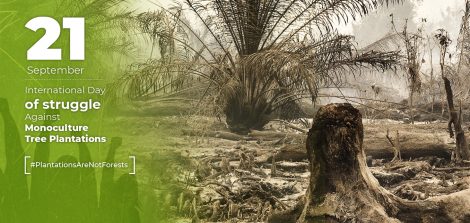This day is to “mark the struggle against monoculture tree plantations, to celebrate the struggles at global level which have succeeded in stopping the advance of monocultures or in exposing their impacts or highlighting that monoculture tree plantations are not something positive, as the public opinion is told in order to justify industrial land grabbing actions and strong environmental, social and gender impacts”, stated Isaac Rojas, co-coordinator of the Forests and Biodiversity Program of Friends of the Earth International, in an interview with Real World Radio.
The struggle carried out by the local communities against monoculture tree plantations is an everyday affair in the world: in Asia Pacific, local communities in Malaysia, Indonesia and Papua New Guinea struggle against oil palm plantations; in Africa, the communities fight against rubber, oil palm plantations and tree plantations to produce wood pulp in Nigeria, Cameroon, Liberia, Swaziland and South Africa, and in Latin America, countries such as Brazil, Argentina, Chile, Ecuador and Uruguay are suffering the impacts of the “green desert” of pines and eucalyptus, while in Colombia, oil palm plantations are advancing for the production of agrofuels, such as in Venezuela and Central America.
“We denounce the impacts and the role of tree plantations and monocultures in general. They are part of a model that exploits nature, men and women, which is capitalist and patriarchal”, said the member of FoEI, who made reference to the strong impact produced by “forest conversion” in terms of climate change due to the fact that plantations release huge amounts of carbon.
As recently denounced by the World Rainforest Movement, plantations also have gender-based impacts: “Women are hired as cheap labor and are exposed to the use of pesticides”, said Rojas.
The also member of COECOCEIBA – Friends of the Earth Costa Rica, highlighted that “Friends of the Earth is working towards community forest management [1], which has been carried out for a long time by indigenous, peasant and Afro-descendant communities. Community forest management results in better lives and biodiversity compared to traditional forest management models, such as national parks or protected wildlife areas”.
In this way, Rojas made reference to the experiences of community forest management in Africa, Asia and some in Latin America, which are carried out many times resisting the attacks of governments that do not let the people stay in said territories or use them in an autonomous way.
He also said that, in some cases, “communities see agroecology as part of community forest management” when using their seeds, fruits or nuts in the production of healthy food, by families of small farmers and communities that “get organized to face obstacles”.
